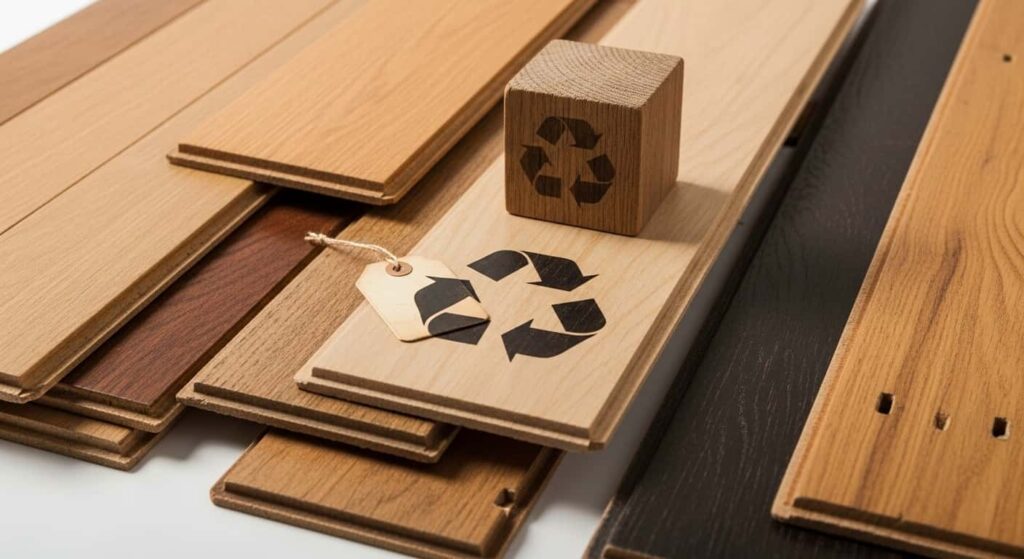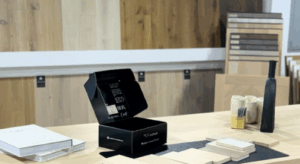You just ripped out your old floors. Now what? If you’re staring at a pile of hardwood flooring in Brooklyn and wondering whether it belongs in a landfill or has a second life, you’re asking the right question. The short answer is yes, hardwood flooring can absolutely be recycled. But there’s more to it.
Americans throw away nearly 10 million tons of wood waste every year. That’s a lot of perfectly good material going to waste. Your old floors could become someone else’s beautiful dining table, garden mulch, or even fuel. But first, you need to know what works and what doesn’t.
We’ll cover what types can be recycled, how to do it, and where to take them. By the end, you’ll know what to do with those old planks.
Can You Recycle Solid Hardwood Flooring?
Solid hardwood flooring is the gold standard for recycling. This is real wood through and through. No layers, no veneers, just pure timber. Oak, maple, cherry, walnut, these are all great candidates.
Here’s why solid hardwood is so recyclable. It can be sanded down and refinished multiple times. Even if your floors look beaten up, someone might want them. Builders love reclaimed wood for its character. Those scratches and dents tell a story.
About 90% of solid hardwood can be reused or repurposed if it’s in decent shape. That’s a pretty good rate. You can reinstall it in another home, turn it into furniture, or grind it into mulch.
Can You Recycle Engineered Hardwood Flooring?
Engineered hardwood is trickier. This type has a thin layer of real wood on top with plywood or fiberboard underneath. The layers are glued together, which complicates things.
You can still recycle engineered flooring, but your options are more limited. You can’t sand it down as many times as solid wood. The veneer is too thin. Once it’s worn out, it’s done.
However, engineered flooring can still be chipped for mulch or burned for biomass energy. Some recycling centers accept it. Just don’t expect it to get a second life as actual flooring. According to waste management data, only about 30-40% of engineered wood products get recycled compared to solid wood.
What Are the Main Ways to Recycle Hardwood Flooring?
You’ve got several paths here. Each one depends on what condition your floors are in and what you want to do with them.
- Reuse and refurbish is option number one. If your planks are still in good shape, they can be cleaned, sanded, and reinstalled somewhere else. This is the most sustainable option because the wood keeps its original purpose.
- Repurpose means turning your floors into something completely different. Old flooring becomes headboards, picture frames, shelves, or cutting boards. Creative folks love this stuff. There’s a whole market for reclaimed wood products.
- Wood chips and mulch is where damaged flooring often ends up. Industrial chippers grind the wood down. Landscapers use it for pathways and garden beds. It’s not glamorous, but it keeps wood out of landfills.
- Biomass fuel is another option. Some power plants burn wood waste to create energy. It’s cleaner than coal and better than letting wood rot in a dump. Your old floors could literally power someone’s home.
People looking for hardwood flooring in Brooklyn often ask about disposal before they even install new floors. Smart thinking. Planning ahead saves time and money.
What Factors Affect Hardwood Flooring Recyclability?
Not all wood is treated equally at recycling centers. Here’s what matters:
| Floor Condition | Heavily damaged wood has fewer options | Sort planks by quality |
| Finish and Coating | Some chemicals prevent reuse | Check if the finish is water-based |
| Fasteners | Nails and staples must be removed | Pull them out before recycling |
| Contamination | Paint, mold, or lead makes wood hazardous | Test old floors for contaminants |
The condition is huge. Warped, cracked, or rotted wood won’t fly for reuse. But it can still become mulch.
Finishes and coatings matter because some chemicals are toxic when burned. Water-based finishes are generally fine. Oil-based polyurethane can be problematic. If your floors are really old, there might even be lead paint involved. Test for that.
Fasteners like nails and staples need to come out. Metal damages chipping equipment and makes wood unsafe for mulch. It’s tedious work, but necessary.
Contamination is the deal-breaker. Mold, termites, or chemical damage can make wood unrecyclable. Floors from flood-damaged homes often can’t be salvaged. Nobody wants contaminated mulch in their garden.
Where Can You Donate or Recycle Old Hardwood Flooring?
You’ve got options in Brooklyn and beyond. Let’s talk about the main ones.
Does Habitat for Humanity Accept Hardwood Flooring?
Habitat for Humanity ReStores take building materials, including hardwood floors. They resell donated items to fund home construction projects. It’s a win-win. You get rid of your floors, and they help families in need.
Not all locations accept flooring, though. Call ahead. They usually want planks in decent condition. No water damage or heavy wear. If your floors qualify, they’ll even pick them up for free in some cases.
Brooklyn has multiple ReStore locations in the greater NYC area. Check their website for what they’re currently accepting.
What Are Wood Recycling Centers?
Wood recycling centers process timber waste from construction and renovations. Several facilities in New York accept hardwood flooring. Some charge a small drop-off fee, while others take it free. They sort the wood, remove contaminants, and send it to recycling streams. Look for certified facilities that follow environmental standards. Your local Brooklyn waste management may also offer special bulk pickup days for old floors.
Is Recycling Hardwood Flooring Worth It?
Yes, it’s worth the effort. Wood in landfills produces methane, a greenhouse gas 25 times stronger than carbon dioxide. One ton of recycled wood saves about 3 cubic yards of landfill space. You also avoid dump fees that can hit $100 per ton in New York. Some centers even pay for quality wood. Plus, your old floors might become a toy box or garden bed. People buying new hardwood flooring in Brooklyn care about sustainability. Recycling shows you do too.
Ready to Upgrade Your Floors Responsibly?
Your old hardwood doesn’t belong in a landfill. It can live again as flooring, mulch, or energy. The key is proper preparation and finding the right recycling spot.
Planning to install new hardwood flooring in Brooklyn? Start with a company that cares about your old floors. At Floorika Fine Hardwood, we install beautiful floors and help you dispose of old ones responsibly. We know which recycling centers accept what and can prep your planks for donation or recycling.




